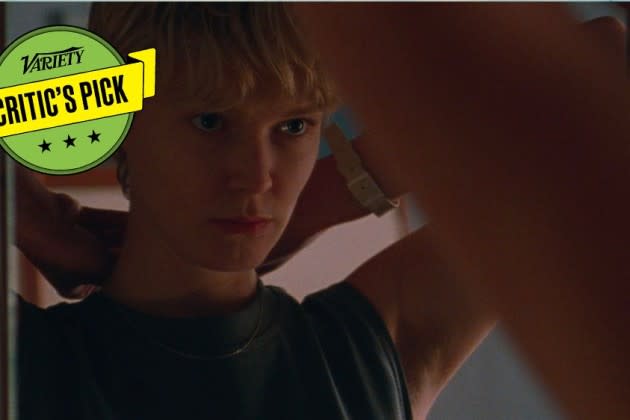‘Blue Jean’ Review: A Lesbian Teacher Faces (and Perpetuates) Systemic Homophobia in a Quietly Searing British Debut
- Oops!Something went wrong.Please try again later.
- Oops!Something went wrong.Please try again later.

At the 1987 Conservative Party Conference in Britain, then Prime Minister Margaret Thatcher issued one of the most grimly memorable quotes of her career: “Children who need to be taught to respect traditional moral values are being taught that they have an inalienable right to be gay.” For many of us, it’s a line that now sounds so archaically out of step with contemporary life as to be comical — that “inalienable right” wording ironically appropriated by many a queer-rights cause — though you need only look at Florida’s recent Don’t Say Gay bill to know that Thatcher’s sentiments live among us still. A frank, piercing debut from British writer-director Georgia Oakley, “Blue Jean” is a Thatcher-era period piece that crisply evokes that climate of politically propagated homophobia without preserving it in amber: It effectively puts the past in tacit dialogue with the present.
The year is 1988, and Thatcher’s government has recently enacted the infamous Section 28 bill, instructing British state schools not to “promote the teaching of the acceptability of homosexuality as a pretended family relationship.” Feeding off the AIDS panic of the moment, and admonishing the Labour Party for their support of gay rights, the Tories made this kind of ratified homophobia a key point of their successful 1987 election campaign; with subtle, pointed attention to social etiquette and casual conversation cues, “Blue Jean” presents a country where such hatred has been blandly integrated into the mainstream.
More from Variety
For most of the staff at the hard-up Tyneside state school where young divorcée Jean (Rosy McEwen) works as a gym teacher, Section 28 makes little difference to how they go about their business. Bar the odd bit of crass anti-gay banter among the students, the subject hardly comes up. To Jean, however, the ruling cleaves her life in two. Marking a new chapter in her life at the outset of the film with a bleach-blonde crop that nods (like the film’s title) to mid-‘80s Bowie, she has only fairly recently come out as a lesbian to friends and family, even if her sister gingerly treats her identity as a kind of unsayable open secret. At work, however, she now has to stay tensely in the closet, her job at risk should any malicious colleague or pupil catch wind of her sexuality, or her “pretended family relationship” with forthright girlfriend Viv (Kerrie Hayes, superb).
The pretense becomes that much harder to maintain when gawky 15-year-old Lois (Lucy Halliday) arrives in her class, and the other girls immediately make the shy, unathletic newbie their punching bag — with queen bee Siobhan (Lydia Page) correctly intuiting her queerness, as the cruellest school bullies so often do. Jean, too, picks up on the exact nature of Lois’s misfit status even before the underage teen starts showing up at the lesbian bar she routinely frequents with Viv. But to defend her too keenly, or to demonstrate her allyship, would also be to invite schoolroom suspicion. In an effort to keep her own head down, Jean finds herself perpetuating the values of Section 28 — a self-betrayal that further threatens her relationship with Viv, who has no time for toeing the line.
It’s a fraught, no-win situation that Oakley’s brisk script negotiates with moral clarity but little rhetorical chiding. Jean’s deliberations between variously barbed, booby-trapped options, and her time-buying prevarications in the interim, are mapped out in premature worry lines on McEwen’s still, extraordinary face. Never quite relaxed even when slouched in sweats, the actor, who first made an impression in TV’s “The Alienist,” plays Jean with the porous, unassertive air of someone who has long had nothing to gain by standing up, or standing out. She has striking foils in the excellent Halliday, whose corrosive, truth-telling gaze belies her wallflower exterior, and Hayes, whose caustic, no-bull Viv is effectively the queer conscience that Jean daren’t voice for herself.
“Blue Jean” itself occasionally hesitates where it could make harder, more confident choices: In an effort not to tie too neat a bow around its thorny themes and relationships, Oakley risks leaving a little too much unsaid by the time of her elegantly open-ended final shot — precisely composed, like many others here, by DP Victor Seguin in a palette of soft, cottony pastels that runs refreshingly counter to the harsh, drab aesthetic common to this milieu in British indies. (The title-matching, stonewashed-blue accents throughout are perhaps a touch tidy.)
If the film feels a little demure, too, in articulating Jean’s sex life and sensual identity, its depiction of a proudly communal working-class lesbian scene feels warm and inhabited — not to mention a relative rarity in British cinema, which, perhaps due to the explicit targeting of men by much anti-gay law in the U.K., has been far more generous in depicting queer male perspectives of oppression and repression. Section 28, of course, was less specific in its blanket discrimination, but Oakley’s restrained yet powerfully poised film doesn’t shoot for fuzzy big-picture universality. Instead it draws one stymied life with such texture and precision that you can see any number of others reflected in it, their identities as certain and inalienable as their rights.
Best of Variety
Sign up for Variety’s Newsletter. For the latest news, follow us on Facebook, Twitter, and Instagram.
